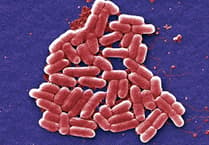Salmonella outbreaks are set to become more frequent as global warming increases the risk of the potentially deadly stomach bug spreading, according to new research.
Scientists at the University of Surrey’s School of Veterinary Medicine investigated how different weather factors influence the transmission of Salmonella, a leading cause of foodborne illnesses in Europe. The bacteria accounts for nearly one in three foodborne outbreaks.
Salmonella lives in the intestines of animals and humans and can contaminate food if it is not cooked or handled properly. Infection can cause diarrhoea, fever, and stomach cramps, and is most prevalent in areas with poor sanitation and hygiene.
The team analysed UK Health Security Agency (UKHSA) data on confirmed Salmonella cases in England and Wales between 2000 and 2016, alongside Met Office weather records. They focused on 14 different weather factors and assessed how these conditions affected the likelihood of infection.
Their analysis identified several key factors that increase the risk of Salmonella outbreaks: warmer temperatures above 10C, relative humidity, dewpoint temperatures between 7C and 10C, and longer hours of daylight. These trends were observed regardless of geographic location.
The findings, published in the Journal of Infection, were validated using independent data from the Netherlands, suggesting the patterns may apply across other high-income European countries.
Dr Gianni Lo Iacono, senior lecturer in biostatistics and epidemiology at Surrey, said: “The model we used shows promise, as the findings were replicated across England, Wales, and the Netherlands. It could provide new insights into Salmonella incidence and potentially be applied to other regions, including tropical countries.”
Study co-author Dr Laura Gonzalez Villeta added: “Our research highlights how weather plays a significant role in Salmonella outbreaks and offers a valuable tool for predicting future risks and tailoring interventions, particularly in the context of climate change.”


.jpeg?width=209&height=140&crop=209:145,smart&quality=75)


Comments
This article has no comments yet. Be the first to leave a comment.